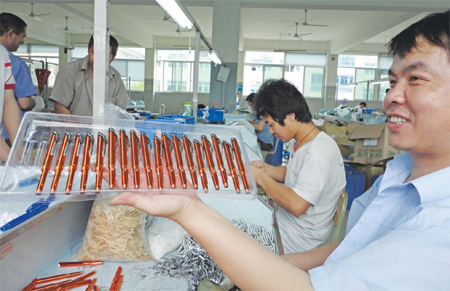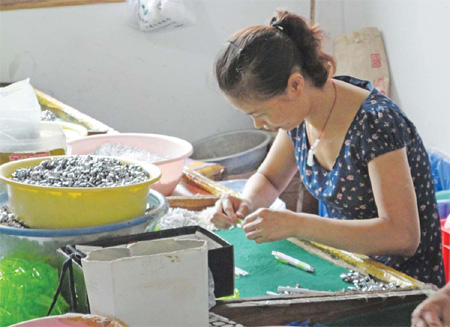Companies
The write stuff
Updated: 2011-07-08 11:45
By Alexis Hooi and Hu Haiyan (China Daily European Weekly)
|
 Xinfu stationary Co produces 70 million ballpoint pens every year, but the company claims profits have been dwindling. Alexis Hooi / China Daily
|
'Pen capital' goes back to drawing board for answers to economic changes taking shape in Zhejiang
Sitting in a small room with nine other people in her village, Zhou Baiqin carefully threads a pen filler through a spring before inserting it in a plastic tube and screwing on the cap. She thumbs the button at the top of the pen to make sure the tip retracts properly and places the completed instrument in a tray.
The 40-year-old mother takes all of 12 seconds to assemble the ballpoint pen, but she says she is still one of the slowest workers in her whole team of 30 people who include her 83-year-old father, relatives and neighbors.
"The fast ones can put together more than 2,000 pieces a day, including meal times and breaks. I'm not so fast because I have to manage the work," Zhou says.
"We can assemble about 30,000 of these ballpoint pens a day. We have to make sure they are all put together well and ready to be shipped out."
Zhou's team is just one of the more than 200 pen "assembly points" in the town of Fenshui in Tonglu county, Zhejiang province.
The town, about 80 km from the provincial capital Hangzhou, has more than 550 enterprises making ballpoint, rollerball, markers and other types of low-cost, mass-production pens. It churns out more than 6 billion pens with an output value of 3.3 billion yuan (355.7 million euros) every year, authorities say, earning it the title "China's pen capital".
From village outfits like Zhou's assembly team to multi-story factories employing about 100 people, more than 19,000 people in Fenshui's registered population of 51,000 are involved in the pen industry, which makes up 67.8 percent of the town's economy to help export its writing instruments worldwide, according to figures from the town's government and Hangzhou's pen industry association.
Shao Weihua, Fenshui's Party secretary, says three out of five of the ballpoint pens sold in Europe and the United States come from the town's workshops.
"In just 30 years, we have gone from our first pen-holder factory to making low-cost, common pens - from scratch - for everyday use throughout the world," Shao says.
But Fenshui is also facing challenges from its rising wealth and other economic changes.
|
|
Zhejiang, one of the country's most prosperous provinces boosted by successful entrepreneurship, has already seen the highest minimum wage increases among 12 provinces and municipalities, mostly in the more developed eastern and southern areas.
Zhejiang's minimum wage has been raised this year from 1,100 yuan a month to 1,310 yuan. The minimum wage in Guangzhou, capital of economic powerhouse Guangdong province, is 1,300 yuan a month. In the financial hub of Shanghai, that figure is 1,280 yuan.
The country's aging population is also set to affect economic growth.
Census figures from the National Bureau of Statistics show that the proportion of the population aged below 15 fell to 16.6 percent last year, from 22.9 percent in 2000. The number of people aged 60 and above also grew to 13.3 percent from 10.3 percent.
The higher wages and standard of living throughout Zhejiang, coupled with the worrying trends of an aging population, mean that many of Fenshui's residents no longer find toiling in pen factories or assembly points worth their while.
They can choose instead to work in its lucrative agriculture sector, which includes honey, bamboo and nut products.
Many who help assemble the pens are older residents who can work flexible hours and earn some extra cash in their spare time instead, each making about 800 yuan a month.
"Our pens are sold in bulk for less than 1 yuan each to our customers, who then sell them under their various brands for much more," Shao says.
"In the past, residents would be willing to work for 30 yuan a day to help make and assemble the pens. But these days, it is difficult to find workers even if they are paid 70 to 80 yuan a day."
Zhou Qingyun is one of Fenshui's pen entrepreneurs dealing with the changing times.
Zhou, 36, started her business in 2004. She employs more than 200 workers in her Xinfu Stationery Company to make more than 70 million pens annually headed to Europe and the US.
"I came to Fenshui after I got married to start my pen-making business," Zhou says.
"My father-in-law was involved in the business for almost 18 years. He set up a small family workshop in 1994, the predecessor of our current company."
"Fenshui offers an excellent environment for making pens. It is no exaggeration to say that almost everyone here is related to this industry in one way or another. There are unique advantages for pen businesses here," she says.

Specials

90th anniversary of the CPC
The Party has been leading the country and people to prosperity.

My China story
Foreign readers are invited to share your China stories.

Green makeover
Cleanup of Xi'an wasteland pays off for ancient city
